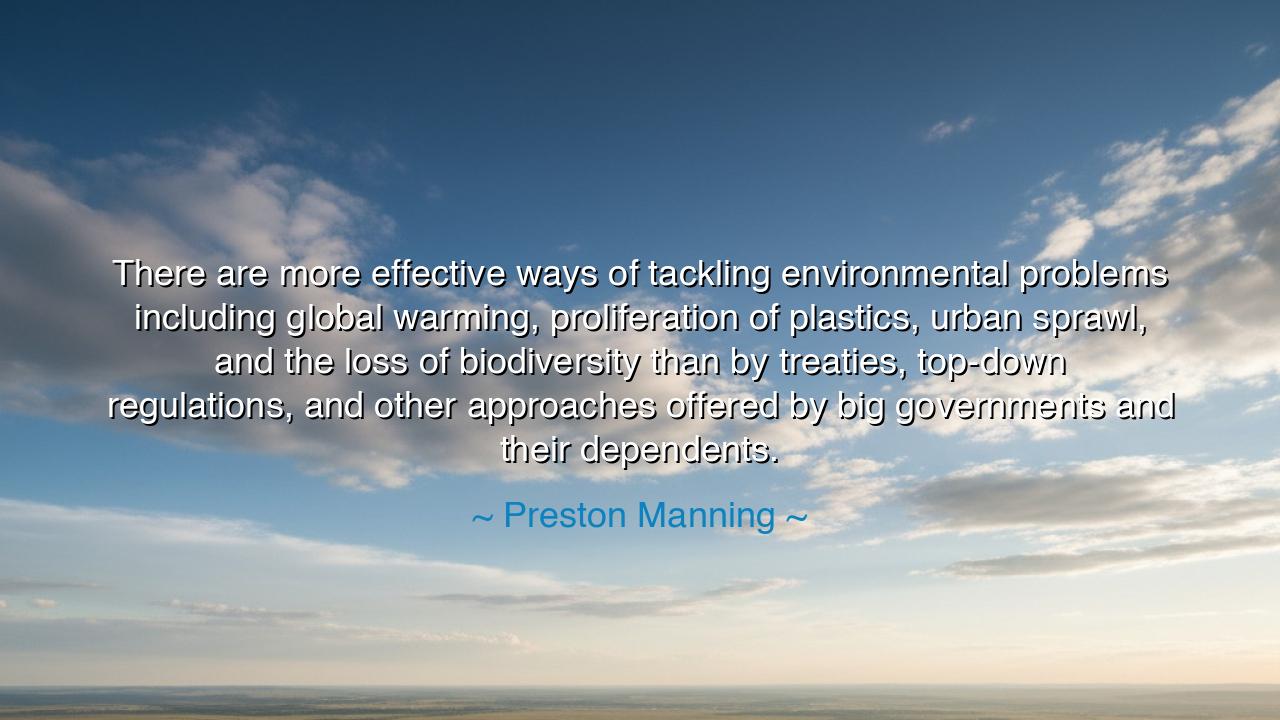
There are more effective ways of tackling environmental problems
There are more effective ways of tackling environmental problems including global warming, proliferation of plastics, urban sprawl, and the loss of biodiversity than by treaties, top-down regulations, and other approaches offered by big governments and their dependents.






Hear the words of Preston Manning, who observed the struggles of nations and spoke with clarity: “There are more effective ways of tackling environmental problems including global warming, proliferation of plastics, urban sprawl, and the loss of biodiversity than by treaties, top-down regulations, and other approaches offered by big governments and their dependents.” In this declaration lies a bold truth: that salvation for the earth will not come solely from distant halls of power, but from the wisdom, courage, and action of people and communities who choose to live differently.
He names the enemies of our age: global warming, proliferation of plastics, urban sprawl, and loss of biodiversity. These are not distant threats; they are present realities. The melting of glaciers, the choking of seas with waste, the endless spread of cities into fields and forests, the vanishing of creatures who once filled the air and waters with life—all these are wounds upon the earth. They are too vast to ignore, too urgent to delay. Yet Manning warns us that the remedies offered by big governments—treaties negotiated in pride, regulations imposed from above—are often blunt and slow, more concerned with appearance than with transformation.
History itself reveals this tension. Recall the Kyoto Protocol, one of the earliest great treaties to address climate change. Nations signed with solemn vows, yet many failed to honor their commitments. Paper promises did not cool the earth’s fever, for treaties without the fire of action are but empty words. Contrast this with the story of communities who rose without waiting: villages that adopted renewable energy, cities that banned single-use plastics, local farmers who protected biodiversity through their own choices. Their acts, small but multiplied, bore more fruit than the lofty declarations of nations.
The ancients too knew that power imposed from above often falters, while change from below endures. Consider the Roman Empire, which sought to command morality and order through law and decree. It crumbled when its citizens ceased to uphold the virtues that gave it strength. Yet the early Christians, humble and scattered, transformed the empire not through imperial edicts but through steadfast living, unity, and example. Manning’s words echo this timeless pattern: that true change flows upward from the choices of the many, not downward from the commands of the few.
To speak of more effective ways is to remind us that responsibility is not to be outsourced. Each household, each community, each enterprise holds the power to act. When individuals reduce waste, when neighborhoods protect their green spaces, when local innovators create solutions that spread, the sum of these efforts grows greater than any decree. This is not to deny the role of governments, but to place trust where it belongs: in the hands of the people whose daily choices shape the destiny of the earth.
The lesson is radiant: do not wait for treaties, nor place your hope in distant powers. Begin where you stand. Plant trees, reduce your plastic use, protect the creatures that share your land. Support local movements, invest in sustainable practices, and encourage innovation in your community. For while laws may guide, it is lived action that saves. Manning calls us to remember that the earth will be healed not by words in marble halls, but by hands in the soil, by choices repeated daily, by the courage of communities that refuse to be idle.
Practical action is clear. Examine your own life—what waste can you reduce? What land can you preserve? What habits can you change to honor the earth? Support leaders who empower communities rather than bind them with empty decrees. Share knowledge with your neighbors, for collective wisdom is stronger than regulation. Live as if the survival of the world depends upon you—for in truth, it does.
Thus, Preston Manning’s words stand as a beacon: that environmental problems will not be solved by treaties alone, but by the living force of people aligned with the earth. Let each generation carry this truth—that while governments may write, it is the choices of the people that will decide whether the earth withers or flourishes. And may we act with the courage to build a future where the soil is fertile, the skies are clear, and the voices of every creature are heard once more.






AAdministratorAdministrator
Welcome, honored guests. Please leave a comment, we will respond soon